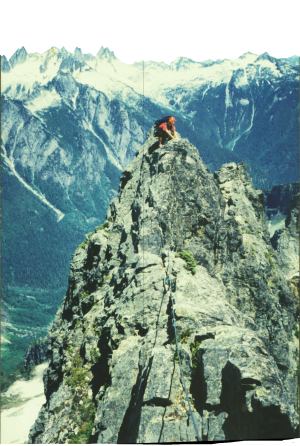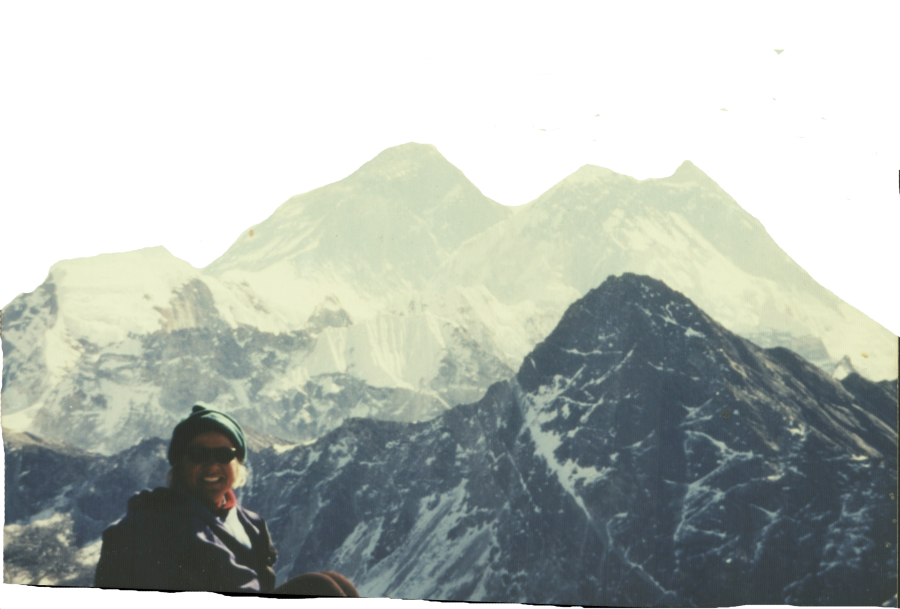Photo provided by Joyce Block.
A life of adventure
February 3, 2017
It’s not every day that you meet someone who has roamed the streets of Kathmandu, trekked in the Himalayas, taught in the Land Down Under, and worked three seasons on an Alaskan cod fishing boat. But if you attend Wenatchee High School, she’s probably graded your biology lab.
The first clue that Joyce Block is not your average science teacher is her classroom. Every inch of wall space is taken up by posters. Whale bones, dried puffer fish, coral, and shells dot the walls and tables like flotsam. Juvenile salmon and lamprey flit about while jellyfish drift silently. The place is more museum than classroom, displaying the treasures of an adventurous life.
Alaska
After leaving her 10 siblings and the family’s South Dakota dairy farm for college, Block found herself working in a genetics lab.
“I was bored out of my mind,” Block said. “I just thought, ‘I can’t do this. I’m going to go crazy if I just scarify seeds and titrate soil samples the rest of my life.’”
Yearning for adventure and a more rewarding job, Block decided to get her teaching credentials. After reading an article about the Kenai Peninsula in her favorite magazine, National Geographic, she decided that was where she wanted to student teach. Aside from her boyfriend’s sister, Block didn’t know a soul in Alaska. But she knew about the mountains, the ocean, and the animals. That was all the motivation she needed.
 Student teaching landed her in Soldotna High School for one life-changing year. Block then left Alaska to teach biology in Texas. But all the beach volleyball and sea turtles in the world couldn’t drown out the call of the mountains, and after just one year Block was flying back to Alaska. The pull was so strong that she accepted a job as the K-12 swim teacher, despite being trained as a biology teacher.
Student teaching landed her in Soldotna High School for one life-changing year. Block then left Alaska to teach biology in Texas. But all the beach volleyball and sea turtles in the world couldn’t drown out the call of the mountains, and after just one year Block was flying back to Alaska. The pull was so strong that she accepted a job as the K-12 swim teacher, despite being trained as a biology teacher.
“I didn’t even care,” Block said. “I just wanted to go back to Alaska.”
While biking with the “Peninsula Pedallers,” Block met the Mullen family, who “adopted” her for the next three years. In the summer, when she wasn’t teaching kids how to swim, Block was out on the water herself working as a deckhand on salmon, cod, and halibut fishing boats. The years of hard work on the family dairy were nothing compared to commercial fishing. The work was grueling and competitive. One season she didn’t see land for an entire month. The job meant 20 hours of non-stop fishing punctuated by a four-hour break. Block would lie in her skinny cot under the fuel tank, her forearms throbbing so violently that she had to cross them over her chest to sleep. There was no slacking, because the harder you worked the bigger your share of the profits would be back at the dock. As the only female on the crew Block was determined to keep pace with every man on board, and she did. Despite the exhausting work, Block spent three summers fishing.
“You do it because it’s high seas adventure,” Block said. “It’s amazing because you see all these whales and northern fur seals and sea lions. You’re in the middle of nowhere and the weather is so extreme and so harsh and I loved it.”
After three years of fishing and teaching swimming, it was time to move on. The science teacher at the time was nowhere near retirement age and Block wasn’t prepared to be a swim teacher for the rest of her life.
“I thought it was fun and interesting but I just couldn’t see myself doing that for years and years,” Block said. “I would’ve stayed in Alaska if I could have.”
Alaska still has a tight grasp on Block, and she returns every few years to visit.
“The people and the wilderness both hold a really special place in my heart,” Block said.
Kathmandu
From Alaska, Block went to Western Washington University for her masters in Biology and then found herself in a little orchard town called Wenatchee. The year was 1991, the Cold War was ending and Magic Johnson was retiring.
Block stayed at WHS teaching biology for five years before going on a teacher exchange to Australia. After Australia she was back in Wenatchee for a year before taking off for Nepal.
“I picked Nepal because I wanted to climb some mountains and understand Buddhism and Hinduism and live in a totally different culture,” Block said.
Block worked as a teacher in an international school in Kathmandu for two years. When she wasn’t teaching, she was climbing in the Himalayas. She came close to summiting Eileen Peak, but was held up by a fierce blizzard. Block described the high altitude climbing as a physically exhausting ordeal. Many people simply can’t tolerate the low oxygen atmosphere of the Himalayas.
“The thing about the Himalayas is your mind can’t really comprehend what you’re seeing,” Block said. “It’s a feeling that I never ever had before.”
Block was fascinated and enraptured by both the landscape and its people.
“I loved the sherpas and all the Buddhists,” Block said. “They’re just really amazing and simple people who live off of potatoes and barley and Yak butter. They’re so happy to see you.”
It was during her adventures in the Himalayas that Block met Philippe, an avid Swiss mountaineer. Block spent the next six years flying to Switzerland to climb and adventure with him.
“I finally decided in 2005 that I just couldn’t keep up this international relationship. He really wanted me to move [to Switzerland] and really wanted to get married,” Block said. “At some point in life you realize that you have to be either here or there.”
Two years later Block met her husband on another snowy mountain, this time at Mission Ridge.
Block, like all true adventurers, still hears the call of distant lands, snow capped mountains, and blooming coral reefs. In five or six years, she has every intention of traveling in earnest once again. Block hopes to go back to the peaks of Nepal, and of course, Alaska. In the meantime, Block will be sateing her appetite for adventure in a few days with a Christmas trip to Hawaii. She will be at home in the ocean snorkeling with Eileen Mullen, who many years ago trained Block as deckhand in the icy waters of Alaska.

